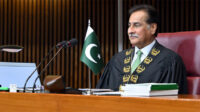The Bombay High Court has acquitted all 12 Muslim men who were convicted in the 2006 Mumbai local train blasts case, declaring them innocent nearly a decade after a special court sentenced them.
The blasts occurred on July 11, 2006, when seven coordinated explosions ripped through first-class coaches of Mumbai’s suburban trains within 11 minutes. The attacks killed 189 people and injured over 824.
In the immediate aftermath, Indian authorities blamed the blasts on Pakistani elements and used the incident to stall peace talks with Pakistan, labeling it a “cross-border conspiracy” without conducting a full investigation. A total of 30 individuals, including 13 Pakistani nationals, were accused.
The prosecution had claimed the blasts were carried out using pressure cooker bombs. Under the Maharashtra Control of Organised Crime Act (MCOCA), a special court convicted 12 Muslim men in September 2015. Five were sentenced to death — Faisal Ataur Rehman Shaikh, Asif Khan, Kamal Ansari, Ehtesham Qutubuddin Siddiqui, and Naveed Hussain Khan — while seven others were given life imprisonment.
However, a division bench of Justice Anil Kilor and Justice Shyam Chandak of the Bombay High Court overturned the special court’s verdict, stating that the prosecution had “completely failed to prove the charges” against the accused. The court ordered the immediate release of all 12 men, highlighting that key witnesses had later revealed they were coerced into testifying under duress and torture by law enforcement officials.
Over nine years of hearings, the trial saw over 250 witnesses testify, many of whom later recanted their statements. The court’s findings raise serious questions about police conduct, judicial impartiality, and systemic bias in terror-related cases in India — particularly against Muslims.
Legal experts and human rights groups have hailed the ruling as a rare but significant blow to India’s entrenched anti-Muslim narrative in the criminal justice system. The acquittals offer a glimmer of hope to the millions of Indian Muslims facing routine police harassment, wrongful detentions, and judicial discrimination.
Observers note that the 2006 train blasts were often contextualized as a reaction to the 2002 Gujarat riots, in which over 2,000 people — mostly Muslims — were killed. The High Court’s judgement is being viewed not only as a vindication for the wrongly convicted but also as a historic setback for the communal policies that have shaped India’s law enforcement and judiciary in recent decades.






